Speakers
Keep checking this page for future updates
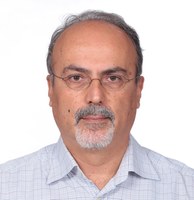
Taner BILGIC
Professor of Industrial Engineering, Bogazici University, Turkey
Taner Bilgiç is a professor of Industrial Engineering at Boğaziçi University, Istanbul. He served as the vice-provost in charge of academic international relations of the university between 2009-2016 and as a member of the University Executive Board until recently. He is currently the chair of the Department of Industrial Engineering. He received his B.S. and M.S. degrees from the Middle East Technical University, Ankara and his Ph.D. from the University of Toronto, all in Industrial Engineering. His research interests include: competitive supply chains, multi-sided markets, graphical models in causality and decision theory. He is also chairing a working committee on restructuring academic governance at Boğaziçi University and is a member of the Association of University Academics (UNIVDER).
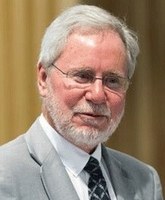
Chris BRINK
former Vice-Chancellor University of Newcastle, UK Member of MCO's Research Committee
Professor Chris Brink served as Vice-Chancellor (President) of Newcastle University in the UK from 2007 till 2016, as Rector and Vice-Chancellor of Stellenbosch University in South Africa from 2002 until 2007, and as Pro Vice-Chancellor (Research) of the University of Wollongong in Australia from 1999 until 2001. Before that he was Professor and Head of the Department of Mathematics and Applied Mathematics at the University of Cape Town, and served as the University’s Coordinator of Strategic Planning. Other positions include a Senior Research Fellowship at the Australian National University in the 1980s. Before moving into management he held the prestigious A-rating of the National Research Foundation, which ranked him as one of South Africa’s leading scientists.
Chris Brink is known as a champion of the idea of a civic university, which he has articulated in two key questions: ‘What are we good at?’ and ‘What are we good for?’. For his work with the city he was awarded the Freedom of the City of Newcastle upon Tyne. During his tenure as Vice-Chancellor, Newcastle University twice won the national THELMA (the Times Higher Education Leadership and Management Award), as well as the Athena SWAN Silver Award for the advancement of gender equality. He is the author of The Soul of a University: Why excellence is not enough (Bristol University Press, 2018) and the editor of The Responsive University and the Crisis in South Africa (Brill/Sense Publishers, 2021).
Currently he serves on the University Grants Committee in Hong Kong, where he convened the sector-wide 2020 Research Assessment Exercise. He is a Distinguished Visiting Professor at the University of Johannesburg and a Fellow of the Royal Society of South Africa. He has served in an advisory or assessment capacity for various universities and organisations.
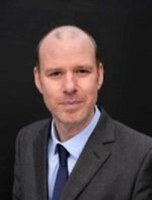
Andreas CORCORAN
Deputy Secretary General, International Association of Universities
For the last two decades, Dr Corcoran has taken an interest in the role universities play in society – history, present, future. He is a keen believer in the transformative power of higher education and sees diversity, academic freedom and integrity as prerequisites for any form of academic enterprise and as the bedrock of progress. He is therefore proud to share the IAU’s mission and to be part of the IAU’s global network committed to the shaping of international higher education policy and the formation of a truly global scientific community.
As Deputy Secretary General, he contributes to the organisation’s institutional and strategic development, takes the lead on the thematic priority ‘Value-based Leadership’, and the IAU cooperation with partners and members. He oversees the development of the reference publications, including the World Higher Education Database.
Prior to joining the IAU, Dr Corcoran was Director of Higher Education at SOFIA in Rome where he managed the higher education portfolio in charge of the financial, academic and institutional development of a university in Tanzania.
Dr Corcoran has worked at the University of Kent in the UK, the Federal Chancellor Willy Brandt Foundation and the German Historical Museum in Berlin. Dr Corcoran has written and and lectured on university management, history and epistemic culture and holds a PhD in intellectual history from the European University Institute in Florence (EUI) and a Masters from Trinity College Dublin; he has studied in Berlin, Rome and London.
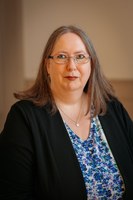
Amanda CROWFOOT
Secretary General EUA
Amanda Crowfoot has been Secretary General of the European University Association – the collective voice of Europe’s universities, with over 850 members – since January 2020. She is responsible for implementing the Association’s strategic plan, acting as an ambassador for its members, and leading a Secretariat of over 40 staff members.
Amanda previously served as Director of Science Europe, the association representing major public research funding and performing organisations in Europe. As Science Europe’s first Director, she was responsible for establishing its office in Brussels in 2012, as well as developing and implementing its policy agenda.
From 2001 to 2012, Amanda worked at the UK Research Office – the Brussels office of the UK research councils – first as a European Advisor and then as Director of the Office. In these roles she worked closely with universities in the UK and beyond, assisting them in accessing EU funding and defining their strategies for European engagement.
With a background in linguistics, Amanda taught and researched at several UK universities, and was Projects Manager at the Centre for Research and Policy in Disability at Coventry University.

Ronald J. DANIELS
President Johns Hopkins University
Ronald J. Daniels has served as the 14th President of Johns Hopkins since 2009. During his tenure, Daniels has focused his leadership on several key areas: strengthening inter-disciplinary collaboration in research and education, enhancing student access, deepening engagement with the city of Baltimore, and supporting economic and social innovation. A law and economics scholar, he has written extensively on the intersections of law, economic development, and public policy, and advocated for the vital role that institutions–and especially institutions of higher education–play in promoting democratic values, including in the recently published What Universities Owe Democracy. Before coming to Johns Hopkins, he was provost and professor of law at the University of Pennsylvania and dean and James M. Tory Professor of Law of the Faculty of Law at the University of Toronto. He is a fellow of the American Academy of Arts & Sciences and the American Philosophical Society. In 2015, he received a Carnegie Corporation of New York Academic Leadership Award and was named a member of the Order of Canada in 2016. Daniels earned a BA and a JD from the University of Toronto and an LLM from Yale University.
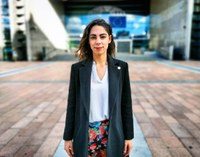
Martina DARMANIN
President of the European Students' Union (ESU)
Martina Darmanin held the office of President, Vice President and Human Rights Coordinator in the European Students Union (ESU). She is currently tVice President of the Lifelong Learning Platform (LLLP). Martina has been active as an elected student leader at the local and national level prior to her European engagement. Her academic background is in the field of Health Sciences and she holds a Master of Science degree from the University of Malta.

John DAVIES
MCO Ambassador, Emeritus Professor of Higher Education Policy and Management & International Consultant in High Education Policy and Management
Emeritus Professor John L. Davies has a career which includes senior institutional management and international research, consultancy and teaching in the field of higher education policy and management. He has been since 2000 a Visiting Professor of Higher Education Management at the International Centre for Higher Education Management at Bach University (and one of the founders of the DBA) and also the Copenhagen Business School. He has been Pro Vice Chancellor (Research and Enterprise) at Anglia Ruskin University, and has also been Dean of the Anglia Business School and Dean of the Graduate School at Anglia; and Pro Vice Chancellor (Quality and Organisation Development) at La Trobe University, Australia.
He has been one of the leading commentators on European higher education management for many years and has been a Consultant with the OECD, the European Rectors Conference (EUA), UNESCO, Soros Foundation, World Bank and the European Commission. He has undertaken numerous strategic consultancy projects in higher education in 60 countries including Brazil, UK, India, Australia, Netherlands, Argentina, Finland, Sweden, Italy, South Africa, New Zealand, Russia and Denmark. His recent projects are in the Republic of Ireland, Kazakhstan, Iraq, Pakistan, Sweden and with the Vatican and Magna Charta Observatory for Universities.
He is very active internationally as a leader, author and team member of strategic audits/reviews of universities especially with the EUA Institutional Evaluation Project; the International Quality Review Project undertaken jointly by EUA, OECD (IMHE) and ACA; the Salzburg Seminar’s Visiting Adviser Programme and latterly with the Australian Universities Quality Agency, the Lithuanian Quality Agency and the Bahrain HE Review Unit.
He has been active nationally and internationally in establishing flagship higher education leadership and management programmes for universities in UK, Europe, Latin America and Australia.
He has authored 80 plus international strategic review reports. His main consultancy, publications and research interests for international, intergovernmental, national, government and HE organisations have been focused on various strands of strategic university development, including internationalisation, strategic planning and quality assurance, the regional role of universities, institutional mergers and reconfigurations, and legislation for Higher Education reform. He is also currently active in the field of Living Values at institutional, national and global levels in the University sector.
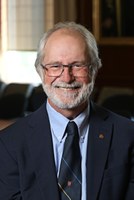
Patrick DEANE
President of the Governing Council of the Magna Charta Observatory
Patrick Deane became the 21st Principal and Vice-Chancellor of Queen's University on July 1, 2019. He is the former President and Vice-Chancellor of McMaster University, a position he held for nine years. Prior to that he served as Vice-Principal (Academic) at Queen's and also held a number of academic administrative appointments at Western University and the University of Winnipeg. Dr. Deane is a Professor of English Literature, with his principal research focus being the relationship between cultural production and British politics in the first half of the Twentieth Century. He read English and Law at the University of Witwatersrand, South Africa, before undertaking graduate studies and receiving both an M.A. and a Ph.D. in English Literature from Western University. Dr. Deane was the first recipient of the John Charles Polanyi Prize for Literature in 1988, and was awarded the Queen Elizabeth II Diamond Jubilee Medal in 2012.
He is President of the Governing Council (designate). His mandate as President will start on June 13th 2021.
His mandate as Governing Council member started on March 14th, 2019 and his first mandate will expire the 13th March, 2023.
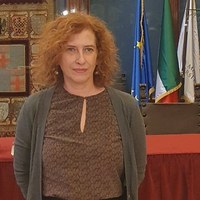
Cristina DEMARIA
Member of the Governing Council of the Magna Charta Observatory and Vice-Rector Alma Mater Studiorum-Università di Bologna
Cristina Demaria is currently the Rector’s delegate for Equity, Diversity and Inclusion of Alma Mater – The University of Bologna. She is a Professor of Semiotics at DAR – Department of the Arts and has worked extensively on cultural representations and practices of gender and intersectionality, genres of testimony, post-conflict representations, the construction and reconstruction of collective and cultural memories. She has authored four monographs and more than eighty articles and book’s chapters, edited and co-edited seven books and several scientific journals’ special issues; she participated in various national and international research projects, such as Diaspora and cultural transfer, an interdisciplinary research project coordinated by the Centre for the Study of Post-conflict Cultures of the University of Nottingham (UK) and funded by the British Academy for Arts; Smart cities, socio-cultural capital and cultural heritage, in collaboration with the Catholic University of Sao Paulo (Brazil); FP7-PEOPLE-2013-IRSES project MEMOSUR -A Lesson for Europe: Memory, Trauma and Reconciliation in Chile and Argentina, and she is currently engaged in H2020-MSCA-RISE-2017 project SPEME- Questioning Traumatic Heritage: Spaces of Memory in Europe, Argentina, Colombia. She has been a visiting professor in many universities and institutes, such as the Institute of Advanced Studies of the University of London, the University of Buenos Aires and the University of Amsterdam - School for Heritage, Memory and Material Culture. She is the referee for many international and Italian scientific journal in the fields of Philosophy and Theories of Languages, Semiotics and Cultural Studies, and sits in the editorial board of international scientific journals and book series. She has been the external evaluator for the award of research grants by FIAS - French Institutes for Advanced Study Fellowships Programme, and by EURIAS - European Institutes for Advanced Study Fellowship Programme, both supported by the European Commission. As the Rector’s delegate for Equity, Diversity and Inclusion, she is a member of several working groups and European networks, such as the Diversity Council of UNA Europa consortium, where she leads the action group on “best practices”; the Equality and Diversity working group of the Coimbra Group; and the Gender and Diversity working group of The Guild of European Research-Intensive Universities.
Stefania GIANNINI
Assistant Director-General for Education, UNESCO formerly, Minister of Higher Education, University and Research, in Italy
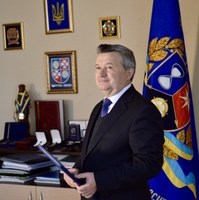
Roman GRYNIUK
Rector, Vasyl’ Stus Donetsk National University, Ukraine
Roman Gryniuk's career path in Ukrainian higher education and university management is varied and full of challenges. For 40 years, he has been walking this path together with his Alma Mater - Donetsk National University: from a student majoring in "Law" to the rector.
Since 1990, Mr. Gryniuk started teaching activity. In 2001, he defended his PhD thesis. In 2007, Mr. Gryniuk defended his doctoral thesis and obtained Doctoral degree, in 2008 he was awarded the academic title of professor. He worked as the Head of the Department of Constitutional and International Law, and later as the Dean of the Faculty of Economics and Law of Donetsk National University. In November 2012, he was elected rector of Donetsk National University.
Roman Gryniuk is actively engaged in research activities. The main areas of his scientific research are the theory of the state and law; constitutional and municipal law. He is the author of more than 70 scientific publications and 7 monographs. Mr. Gryniuk is a member of the Scientific and Advisory Board of the Constitutional Court of Ukraine, member of the editorial board of specialized scientific journals. Rector has an extensive experience in international projects with the support of the International Renaissance Foundation, British Council, USAID, Erasmus+, etc.
Since 2013, Roman Gryniuk has been an Honorary Doctor of the Dimitar A. Tsenov Academy of Economics (Svishtov, Bulgaria). On June 12, 2015, Rector of Donetsk National University received the Freedom Awards - an award given by the Atlantic Council to Donetsk National University for supporting academic freedom, territorial integrity, and commitment to the values of democracy. In 2016, Mr. Gryniuk was awarded the honorary title "Honored Lawyer of Ukraine" by Presidential Decree.
2014 was a serious test for the entire university community and for Roman Gryniuk as rector. The beginning of russian military aggression in the East of Ukraine and the fundamental reluctance to cooperate with the occupier forced him and the university team to leave their small homeland in October 2014 and move to Vinnytsia, which is in Central Ukraine. On November 3, 2014, the University started the educational process in Vinnytsia. This became a new page in the history of Alma Mater.
Unshakable civil position, respect for those graduates who give their lives for Ukraine and the quality of education – are the values that permeate all activities of the University. In 2022, with the beginning of a full-scale russian invasion of Ukraine, Roman Gryniuk and the university staff are working for the reconstruction, development, and establishment of Ukraine as a leading European state, which today stands in defense of the democratic freedoms of the entire human civilization.
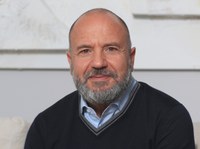
Salah KAHLIL
Macat International Ltd
A social entrepreneur with a specific interest in education, employability, the future of work, 21st-century skills and the global skills gap. Salah is the founder of Macat International Limited, which is a unique venture set up in the UK to measure and develop critical thinking skills. He is also the founder of The Alexandria Trust, a London-based charity dedicated to restoring world-class education in the Arab region. Working with leading journalists, the Trust has established Al-Fanar Media, a bilingual online publication that covers news about education, arts and culture in the Arab world. Underpinning this work is his vision for a new era of philanthropy in the Arab world – catalytic philanthropy to support a step-change in education – that grew out of his extensive experience in the areas of business, political reform, institutional change, and international development. Salah is a board member of a number of organisations and previously a founding member of The Egyptian competitiveness Council, a member of the AUC Business School Advisory Board and the Business Sector Secretariat and the founding contributor/architect of Egypt's vision 2030.
Matteo LEPORE
Mayor of Bologna, Italy
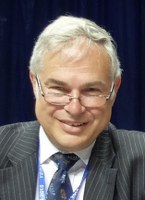
David John LOCK
Secretary General, Magna Charta Observatory
David Lock has had a varied career in international higher education and university leadership.
As Director of International Projects at the UK’s Leadership Foundation for Higher Education, David was responsible for instigating and delivering projects with over 30 different countries, some at Governmental level. Projects have included major programmes for Rectors and Ministry Officials to implement national HE reform and autonomy strategies over several years and building partnerships between universities in different countries.
Until October 2007 David was the founding Registrar and Acting Chief Executive of the British University in Dubai where he structured, built and then led the University following its legal creation by the Ruler of Dubai as a not-for-profit provider of Higher Education to UK standards.
Prior to going to Dubai David was Secretary to the University of Huddersfield and Registrar and Secretary to the University of Hull in the UK for a total of 14 years. A teacher and Chartered Secretary by background, David has served on a number of international bodies and undertaken a range of consultancy assignments including international development and UK HE governance projects. He is Chairman of the Gulf Education Conference and serves on the International Advisory Committee of the British Council.
He has been appointed Secretary General of the Magna Charta Observatory in September 2014.
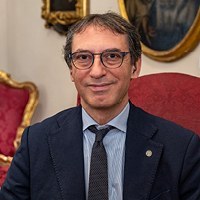
Giovanni MOLARI
Rector of the Alma Mater Studiorum - Università di Bologna and President of the Magna Charta Observatory
Born in Bologna in 1973. Full professor in Agricultural Machinery and Mechanisation at the University of Bologna since 2016, Associate professor from 2010 to 2016 and researcher from 2000 to 2010. PhD in Materials Engineering at the University of Modena and Reggio Emilia. He is qualified to practice as an engineer and has a degree in Mechanical Engineering from the University of Bologna.
His research activity mainly focused on issues in designing agricultural machines and testing the reliability of agricultural tractors, in particular accelerated tests for the structural verification of such machines and their transmissions. In addition, he dealt with tillage machines, crop harvesters and machines for animal husbandry, as well as the use of biomass to produce energy.
He has coordinated national projects, acted as a scientific supervisor in numerous research agreements with companies, and authored more than 150 manuscripts, 53 of which published in journals indexed on Scopus.
He was editor-in-chief of the Journal of Agricultural Engineering from 2014 to 2018, where he was managing editor for the 2006-2014 period; he oversaw its switch to English, its transition to open access and its indexing first in Scopus and then on the Web of Science.
At the University, he was Deputy Head of the Department of Agricultural and Food Sciences of the University of Bologna from 2015 to 2018. After a single department of agriculture was established, he was the director for three years from 2018 to 2021, and was then reconfirmed in this role for the following three-year period. From 2018 to 2021, he was a member of the Academic Senate of the University of Bologna and a member of the university’s human resources committee.
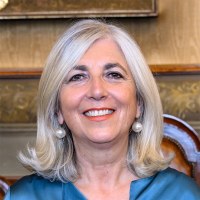
Rita MONTICELLI
University of Bologna, Italy City Councilor for Human Rights and inter-religious dialogue
Rita Monticelli is City Councilor, with responsibility for human rights, interreligious and intercultural dialogue in the city of Bologna.
A full professor at the University of Bologna, she teaches Gender Studies, Feminist Theories between Difference and Diversity, English Literatures and Literatures in English; Postcolonial Theories and Cultural History. She has published essays, monographic and collective volumes on these topics.
She has participated in European projects on intercultural women's studies, cultural memory in Europe, the intersection of humanities and sciences, gender and the culture of equality in Europe, and in networks for the promotion of gender equality and inclusion. She was part of the University Equal Opportunities Committee, for which she organised the info-training sector. She has served as the Rector's delegate for university equal opportunities and as a university trustee. She has served on the Academic Senate.
She participates in European projects, represents the University of Bologna in the SSH Deans and Gender&Diversity groups of the GUILD (European Research-Intensive Universities) European network and is a member of the governing board of EASSH, European Alliance for social sciences and humanities. She is Advisor for the EQUALS EU AAC (Europe's Regional Partnership for Gender Equality in the Digital Age) project.
She is the coordinator of the GEMMA (gender and women's studies) Master of Excellence program for the University of Bologna and the director of the Centre for Utopian Studies and Research at the University of Bologna.

Sibongile MUTHWA
Vice-Chancellor and Principal, Nelson Mandela University
Sibongile Muthwa is the Vice-Chancellor of Nelson Mandela University, South Africa. She has a distinguished career both in South Africa and internationally, working in development and public-sector institutions, and in academia. She is the former Director of the University of Fort Hare Institute of Government; a former Director-General of the Eastern Cape Provincial Government; and the former Deputy Vice-Chancellor, Institutional Support, of Nelson Mandela University.
She is deeply committed to gender justice, social inclusion and active democratic participation. She is the former Trustee of South African Women in Dialogue (SAWID). She was the Commissioner and Deputy Chair of the Financial and Fiscal Commission between until 2019. She is the current Chair of Universities South Africa (USAf), a membership organization representing the 26 South African Public Universities.
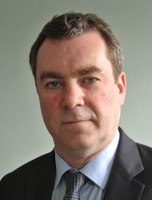
Brendan O'MALLEY
Editor in Chief, University World News
Brendan O’Malley is editor in chief of University World News, the global online higher education publication. He is also an independent consultant for UN agencies and iNGOs on issues ranging from higher education for refugees, to protection of education from violent military and political attacks, education in conflict and Education for All. A 1999 book he co-authored on the impact of US and UK strategic interests on the Cyprus problem was shortlisted for the Orwell Prize.

Sherine OMONDI
Global Student Forum
Sherine Omondi is an impact driven and transformational young leader committed to the cause of youth, women and an all-inclusive society. She is a policy enthusiast and advocates for Quality Education for All. Sherine represents the Commonwealth Student Association in the Steering Committee of the Global Student Forum and is a community mobilizer in the field of education.
She is a graduate of the Young African Leaders Initiative with requisite social inclusion skills and a background in Human Centered Design thinking (HCDT) and public management. She holds a bachelor’s degree in Education from Moi University and is a Monitoring and Evaluation Expert in the field of Higher Education.
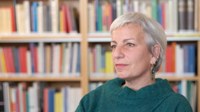
Claudia PADOVANI
Coordinator SAR Italy
Claudia Padovani is Associate Professor in Political Science and International Relations at the University of Padua (Italy). Padovani is one of the 3 co-coordinators of the Scholars at Risk (SAR) national section in Italy, which comprises 33 universities. She co-chairs the SAR Italy Working Group on Advocacy and co-directs the Padua Students’ Advocacy Seminar, and is the SAR Italy representative in the European Coordinating Committee for Academic Freedom Advocacy.

Milica POPOVIC
Fellow in residence Global Observatory on Academic Freedom (GOAF)
Dr Milica Popović is a Postdoctoral Fellow and Project Lead of the Open Society University Network Global Observatory on Academic Freedom at the Central European University in Vienna. In parallel to her academic career and teaching experience at Sciences Po in Paris and at CEU in Vienna, Popović gained 20 years of professional experience within international organizations, and she has worked as an independent researcher and consultant in the European Higher Education Area since 2008. Her professional expertise in the field of higher education policy, combined with her academic career, led her to the field of academic freedom and its relationship with identity politics and memory narratives, as well as the issue of conceptualization of academic freedom in the rising authoritarian environments across the globe.
Popović obtained her PhD in Comparative Political Sociology at the Doctoral School of Sciences Po Paris and in Balkan Studies at the University of Ljubljana in 2021, under the title “(Post)Yugoslav memories as resistance strategies – Understanding the political significance of Yugonostalgia”, and she is currently preparing a book on the same topic. Her academic research interests remain in the field of Memory Studies, looking into the interplays between memory and political identities, the transmission of memory within families of deserters in post-conflict societies.

Elizaveta POTAPOVA
Researcher at the Public Policy and Management Institute, Lithuania
Elizaveta Potapova holds a PhD in political science from the Central European University. At the moment she is a researcher at the Public Policy and Management Institute (Vilnius) where she is part of a team working on education policies for EU agencies. Potapova’s research interests include academic freedom, sociology of the academic profession, experiential teaching and learning, and higher education policies with a focus on participative models of governance.
Amr Ezzat SALAMA
Secretary General, Association of Arab Universities

Massimiliano TAROZZI
UNESCO Chair in Global Citizenship Education in Higher Education, Professor of General and Social Education at the Department of Life Quality Studies, Italy
Massimiliano Tarozzi is UNESCO Chair in Global Citizenship Education in Higher Education. He is full Professor at the University of Bologna where he is founding director of the International Research Centre on Global Citizenship Education (GCED). He was Co-Director of the Development Education Research Centre at UCL Institute of Education where he is Visiting Professor. He is member of the Advisory Board and Coordinator of Academic Network on Global Education and Learning.
He has been studying in the field of intercultural education for more than 20 years and has extensively published on the topics of global citizenship education, intercultural education, citizenship education, social justice education, and qualitative research methods.
He has been teaching GCED in various MA programmes both in Bologna and at the institute of education in London and he has been regularly invited as visiting professor in several international universities including UCLA, Seattle, Harvard, USP, São Paulo, Normal Beijing University.
Outside academia, he worked for an Italian NGO as head of educational area and then as consultant for several International NGOs and local authorities. He was appointed President of the Institution governing the educational services in the Municipality of Bologna.
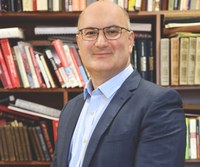
Giga ZEDANIA
Chair of the MCO Research Committee
Giga Zedania is the Rector of Ilia State University (Tbilisi, Georgia) since 2014. Before this appointment he served as the Dean of the Faculty of Arts and Sciences and the Head of the Quality Assurance Service at Ilia State University, where he has been teaching first as associate and then as full professor since 2006. He studied philosophy, sociology and cultural studies in Georgia, USA, Hungary and Germany, obtaining his PhD from Ruhr University Bochum. His publications range from European intellectual history to the socio-political transformation of the South Caucasus. He served as the President of Black Sea University Network (2016-2018).